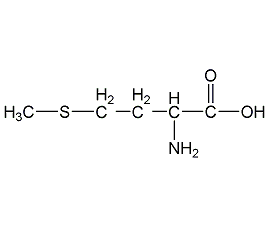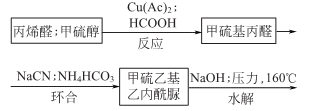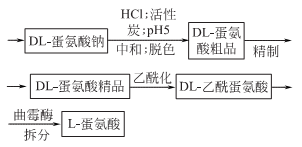
Structural formula
| Business number | 01CV |
|---|---|
| Molecular formula | C5H11NO2S |
| Molecular weight | 149.21 |
| label |
(S)-2-Amino-4-(methylmercapto)butyric acid, methionine, (S)-2-Amino-4-(methylmercapto)butyric acid, (S)-(+)-Methionine, L-Methionine, Biochemical reagents, aliphatic sulfur compounds, Intermediates |
Numbering system
CAS number:63-68-3
MDL number:MFCD00063097
EINECS number:200-562-9
RTECS number:PD0457000
BRN number:1722294
PubChem number:24897343
Physical property data
1. Properties: White flaky crystals or crystalline powder, particularly smelly, slightly sweet
2. Density (g/mL, 25/4℃): 1.206
3. Relative vapor density (g/mL, air=1): Uncertain
4. Melting point (ºC): 281 (dec.)(lit.)
5. Boiling point (ºC, normal pressure): Uncertain
6. Boiling point (ºC, 5.2kPa): Uncertain
7. Refractive index: Uncertain
8 . Flash point (ºC): Uncertain
9. Specific rotation (º): 23.25 º (c=2, 6N HCl)
10. Autoignition point or ignition temperature (ºC): Uncertain
11. Vapor pressure (kPa, 25ºC): Uncertain
12. Saturated vapor pressure (kPa, 60ºC): Uncertain
13. Heat of combustion (KJ/mol): Uncertain
14. Critical temperature (ºC): Uncertain
15. Critical pressure (KPa): Uncertain
p>
16. The logarithmic value of the oil-water (octanol/water) partition coefficient: Uncertain
17. The upper limit of explosion (%, V/V): Uncertain
18. Lower explosion limit (%, V/V): Uncertain
19. Solubility: L body is soluble in water and warm dilute ethanol, but insoluble in absolute ethanol, ether, petroleum ether, benzene, and acetone. DL body is soluble in water, dilute acid and dilute alkali solutions, easily soluble in 95% ethanol, and insoluble in ether.
Toxicological data
Acute toxicity: Rat oral LD50: 36 mg/kg; Rat intraperitoneal LD50: 4328 mg/kg; Mouse intraperitoneal LC50: >9500 mg/kg;
Reproduction: Rat oral TDLo: 26100 mg/kgSEX/DURATION: female 10-20 day(s) after conception; Rat oral TDLo: 14720 mg/kgSEX/DURATION: female 10-20 day(s) after conception; Rat oral TDLo: 35 gm /kgSEX/DURATION: female 2 week(s) pre-mating female 1-21 day(s) after conception;
Mutation: Escherichia coli Mutation in microorganisms test system: 100 mg/L;
Ecological data
None yet
Molecular structure data
1. Molar refractive index: 38.26
2. Molar volume (cm3/mol): 123.7
3. Isotonic specific volume (90.2K ): 329.9
4. Surface tension (dyne/cm): 50.5
5. Polarizability (10-24cm3): 15.17
Compute chemical data
1. Reference value for hydrophobic parameter calculation (XlogP): None
2. Number of hydrogen bond donors: 2
3. Number of hydrogen bond acceptors: 4
4. Number of rotatable chemical bonds: 4
5. Number of tautomers: none
6. Topological molecule polar surface area 88.6
7. Number of heavy atoms: 9
8. Surface charge: 0
9. Complexity: 97
10. Number of isotope atoms: 0
11. Determine the number of atomic stereocenters: 1
12. Uncertain number of atomic stereocenters: 0
13. Determine the number of chemical bond stereocenters: 0
14. Number of uncertain chemical bond stereocenters: 0
15. Number of covalent bond units: 1
Properties and stability
1. This product is non-toxic and can be used as a feed additive. However, it has been reported that ingesting large amounts of this product can cause symptoms such as vomiting and loss of appetite. For rats, intraperitoneal injection, type L: LD50 is 29mmol/kg; type D: LD50 is 35mmol/kg. Special attention should be paid to the use of highly toxic raw material sodium cyanide in the production process of methionine. Therefore, the production workshop should take corresponding measures according to the requirements for sodium cyanide toxicity protection: the equipment should be sealed, the production site should be well ventilated, and the operators should wear protective clothing. Supplies etc.
2. Found in burley tobacco leaves.
Storage method
1. This product should be kept sealed, cool and dry.
2. Packed in wooden barrels lined with plastic bags or kraft paper bags, and should be stored in a cool, ventilated and dry place. It should be sealed, protected from light and moisture during storage and transportation. Transport according to general chemical regulations.
Synthesis method
1. Acrolein and methylmercaptan are obtained by chemical synthesis or separated from casein acidolysis solution.


2. Tobacco: BU, 22; Synthesis: It can be obtained by hydrolyzing and refining casein. It can also be prepared by the Strecker synthesis reaction of methyl mercaptan and acrolein.
Purpose
1. It has detoxification effect. Used in biochemical research and nutritional supplements.
2. Used for biochemical research. It is used in the fields of chiral drugs, chiral additives, chiral auxiliaries, etc., and is used as a chiral source for chiral synthesis in the pharmaceutical industry.
3.Amino acid drugs. Nutritional supplements. Prepare amino acid infusion. Used for acute hepatitis, fatty liver and cirrhosis. It is also used as an auxiliary treatment for alcohol and sulfonamide poisoning.
4. Can maintain body growth and development and nitrogen balance. It is suitable for preventing and treating liver disease and arsenic or benzene poisoning. It is also used to treat dysentery and malnutrition caused by protein deficiency after chronic infectious diseases.

 微信扫一扫打赏
微信扫一扫打赏

